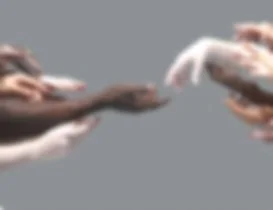
Review: Becoming Human: Matter and Meaning in an Antiblack World by Zakiyyah Iman Jackson (2020)
Lzz Johnk
This is a book I have been waiting for.
Specifically, I have been longing for thought work that explodes Man’s unchallenged supremacy over the so-called Chain of Being and the Chain of Being, itself. Zakiyyah Iman Jackson’s Becoming Human investigates imaginal practices that are not preoccupied with the singularity and universality of eurowestern cosmology but see through and beyond them. Becoming Human meticulously documents the form and function of (anti)Blackness in relation to the Enlightenment’s creation and proselytization of “universal humanity” and opens the door to worlds and “worlding” practices that embrace, rather than demonize or hierarchize, alterity and its possibilities. To accomplish any substantive seeing through and beyond this eurowestern framework of the Human, she suggests, our practices and analyses must interrogate the plasticity that Blackness has been made to embody and the implications of this violence for humanness, animalness, and beingness.
Years ago, I was introduced to Cherokee literary scholar Daniel Heath Justice’s four guiding questions of critical kinship (Why Indigenous Literatures Matter 2018): 1) How do we learn to be human? 2) How do we behave as good relatives? 3) How do we become good ancestors? 4) How do we learn to live together? I have returned to this set of questions again and again, only to find that the first question leaves me more unsettled each time. How do we learn to be human on the other side of that violent “epochal rupture” (45) in spacetime called Atlantic slavery? How do we learn to be human in a world in which the dominant idea of humanness depends upon antiblackness? As a participant in ongoing multi- and transdisciplinary conversations, Jackson productively troubles the question of be(com)ing human. One of the most compelling (and, for some, disturbing) challenges these conversations pose is the unsettling and potential overturning of the human/Man as real, desirable, inevitable. In colonial/modern eurowestern cosmology, the human/Man is a foregone conclusion whose rubric is nevertheless constantly morphing. Jackson’s first major contribution is to distill a broad spectrum of thought work on humanity, animality, and their dichotomization to clarify that the human/Man is not a foregone conclusion, at all, and that the keys to overturning this conclusion lie with what she calls its “limit case”: the (especially maternal) Black woman. Through a deconstruction of this limit case, Jackson asserts the centrality of gender, sexuality, and maternity in structuring the delineation between “race” and “species”—which Jackson clarifies are “mutually reinforcing terms” (12)—in Enlightenment philosophy and science.
In her introduction, Jackson brilliantly constellates the work of Sylvia Wynter, Hortense Spillers, Saidiya Hartman, Christina Sharpe, and other Black feminist metaphysicians (to borrow Alexis Pauline Gumbs’ naming) to lay the groundwork for understanding the significance of gender, sexuality, and maternity in the shifting production of race and species and for the unraveling of the human/animal dichotomy that follows in her close readings of African diasporic cultural productions. This analytic contextualization may be conceptually challenging for readers who have not yet engaged with the contributions of these thought workers, and even for those familiar, rereading will likely be necessary. However, readers who accept the premises she outlines here will be rewarded with a crucial overview of Blackness’ mediating relation to and between humanity and animality; the conceptual tools necessary to critically interrogate both the human/Man and the animal; and the encouragement to be imaginally curious.
Becoming Human articulates a directive to move beyond questioning the validity of the human and the human/animal dichotomy as central cosmological axioms and toward their dismantlement. The stakes of Jackson’s project are made clear through another significant contribution, her theorization of the “plasticity” that Blackness is subjected to: as a result of being ontologically plasticized and “experimented with as if it were infinitely malleable…blackness is produced as sub/super/human at once, a form where form shall not hold” (3). As her chapter analyses demonstrate, as a function of bio/necropolitical white supremacy, plasticity variously renders Black people as not quite human, not quite animal, sometimes one or the other, and sometimes both at once. This plasticity also positions Blackness as a kind of liminality, a borderland. That is, “black(ened) people are the living border dividing forms of life such that ‘the animal’ is a category that may apply to animals and some humans” (22).
In the body chapters that follow, Jackson undertakes an analysis of a broad range of African diasporic cultural productions—from Frederick Douglas’s oratories to Wangechi Mutu’s collages to Black feminist speculative fiction—which demonstrate how their creators are not seeking to fold Blackness into humanness, but rather these works confront and undermine the Enlightenment rubrics of the Human, altogether. Venturing deep into and beyond the potentialities and threats posed by the tenuous relationship between Blackness and animality, Jackson’s imaginal theorizing draws out critical practices of (queer, feminized, maternal) Black worldmaking. As her analysis unfolds in each chapter, we notice that engaging in practices of dismantlement is incidental to paying attention to and investing in (O)ther cosmologies—including generative imaginal practices that she terms “worlding”—being created by Black(ened) people, especially (queer) Black women. Below I attend to two worlding practices suggested by Jackson that illustrate ways of engaging alterity beyond liberal humanist projections: taking seriously “animal perspectives” via “trans-species correspondence,” and the potentiality of mutation as a creative and imaginal practice.
In Chapter One, “Losing Manhood,” Jackson thinks together Douglas’ oratories and Toni Morrison’s Beloved to call for a reimagining of the animal, that “locus of possibility” (53) against and around which necropolitical white supremacy consolidates its interpellative power. Such a reimagining would potentially liberate the animal from its requisite symbolic labor of “animat[ing] antiblack discourse” (53) and in turn upend the human/animal distinction which Blackness plastically mediates. Jackson offers a performance of this reimagining through her close reading of animality and human-animal interaction in Beloved, particularly the “animal perspective “of Mister the rooster and Paul D’s unsettling “trans-species correspondence” with him (73). Their correspondence disrupts the “modern grammar of the Subject” (61)—a subjectivity from which “animalized” entities are excluded—and opens possibilities for “another mode of relating” (80).
In Chapter Four, “Organs of War,” Jackson scrutinizes the mutual shaping of antiblack aesthetic ecology and sexual reproduction (especially Black maternity). She contends that one result of this mutuality is that “the question of ‘race’ was never conclusively separated or disengaged from the question of ‘species’” (171), forcing Black women and Black maternity to act as the continual delimiter of humanness. This forced position—itself a form of plasticity—is the result of eurowestern Enlightenment developing a taxonomy of species, as well as race, which is contingent upon the (in)ability to reproduce. To intervene on the forced positioning of “female Blackness” as humanity’s limit case, Jackson turns to Wangechi Mutu’s collages, which take up mutation, “that radical alternation in the interstice of chance and design” (179), as an aesthetic and creative element. By playing with mutation, Mutu’s One Hundred Lavish Months of Bushwhack visualizes an upending of the eurowest’s teleological, progressivist, and developmental claims about history. Extending on this imaginal practice of mutation portrayed in One Hundred, Jackson argues that “historical movement is a more-than-human inter(intra)actional process” (180), again requiring and gesturing toward an(O)ther relational mode that destabilizes the human within a broader collage of being. Jackson’s careful attention to African diasporic cultural productions and gestures toward alter-relational modes reaffirm the power of imagination and imaginal practices to (re)create worlds.
The critical questions and challenges that Becoming Human poses are relevant to a broad range of disciplinary and scholar-activist inquiry, including Indigenous Studies, Postcolonial Studies, Critical Animal Studies, Queer Studies, and Women, Gender, and Sexuality Studies. As a Mad Studies and Disability Studies scholar, I am eager to see more explicit interrogation of the human/animal dichotomy, with which Mad/Disability Studies thought workers have continually grappled but very few have contextualized within what Jackson calls the “matrix of antiblackness” and Christina Sharpe calls the “total climate” of antiblackness. Postcolonial Studies, too, will be usefully transformed by a reshaping of its key questions and guiding principles (e.g. the telos implicit in “post”) vis-à-vis this matrix / total climate. Further, the field must contend with the ways that antiblackness has been exported globally via scientific and capitalist imperialism and colonialism, such that it now permeates transnational and even geographically specific understandings of “humanity” far beyond the eurowest.
Becoming Human is a book for which the eurowestern academy has been waiting, perhaps fearfully. If taken seriously, it portends imminent and (hopefully) radical change to the substance and structure of the academic disciplines—and even the necropolitical order of US empire, as Jackson alludes to in her final chapter, “Coda.” How will students and scholars across disciplines, as well as outside of the academy, respond to Jackson’s strategic dismantling of humanism and radical reframing of questions of being and relating? What (O)ther imaginal practices and worldings will come out of such conversations? And will these happen soon enough to change the course of the devastating loss of alterity (biodiversity) that we are currently on? Of the many possible alternate paths Becoming Human reveals, all of them necessitate a confrontation with the matrix of antiblackness that is long overdue.
Works Cited
Gumbs, Alexis Pauline. M Archive: After the End of the World. Duke University, 2018.
Justice, Daniel Heath. Why Indigenous Literatures Matter. Wilfred Laurier University Press, 2018.
Sharpe, Christina. In the Wake: On Blackness and Being. Duke University Press, 2016.

Lzz Johnk is queer, Mad, agender writer and an independent scholar from Michigan. Their areas of research include Mad Studies, Disability Studies, Queer Studies, women of colour feminisms, decoloniality, and abolition. More of their work can be found in Feral Feminisms, International Journal of Critical Indigenous Studies, and Ethnic Studies Review. They received their PhD in Spring 2021 from Oregon State University, where they also cofounded the OSU Disability Archives. They were a visiting professor of Women, Gender, and Sexuality Studies at Grand Valley State University during the 2021-22 academic year.
